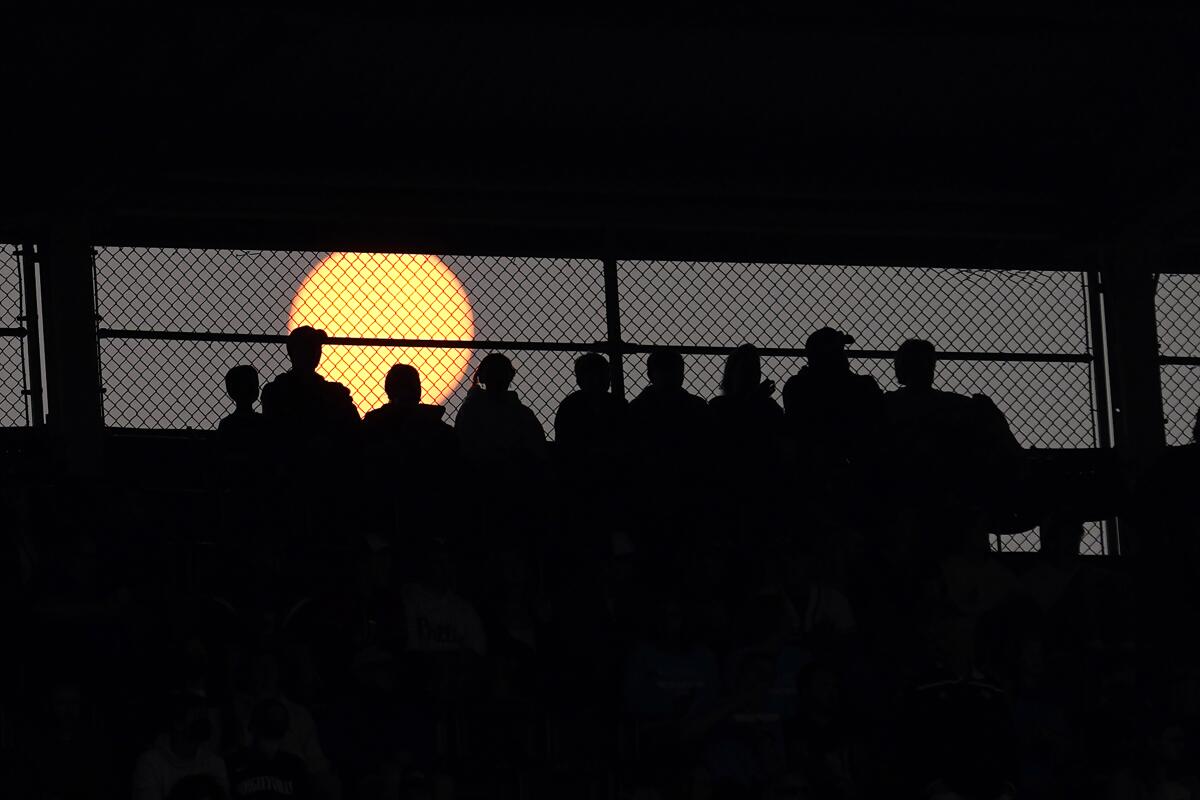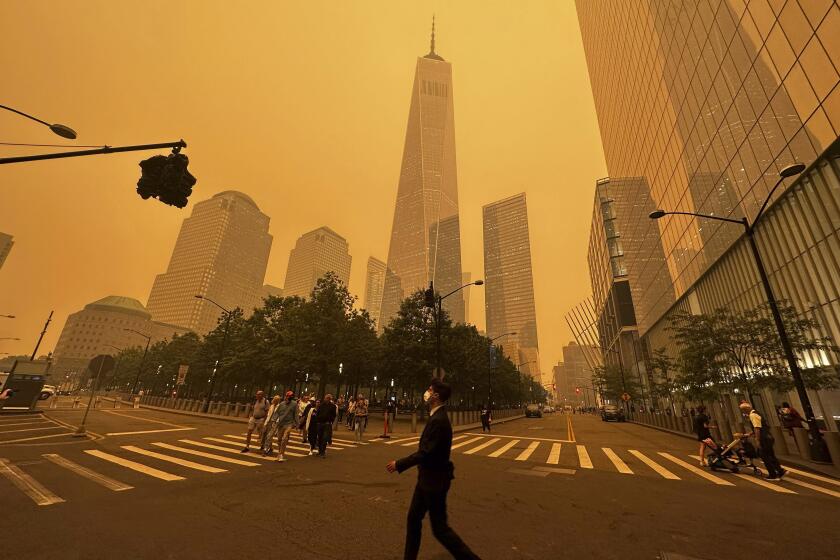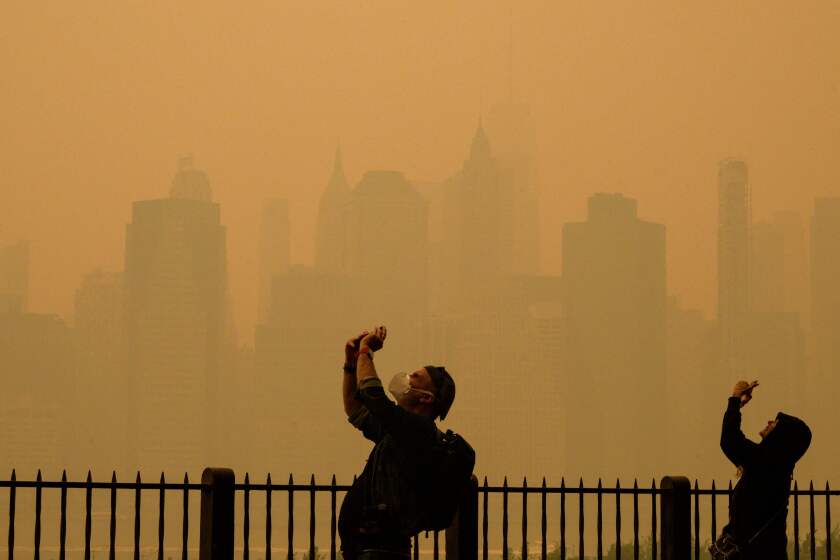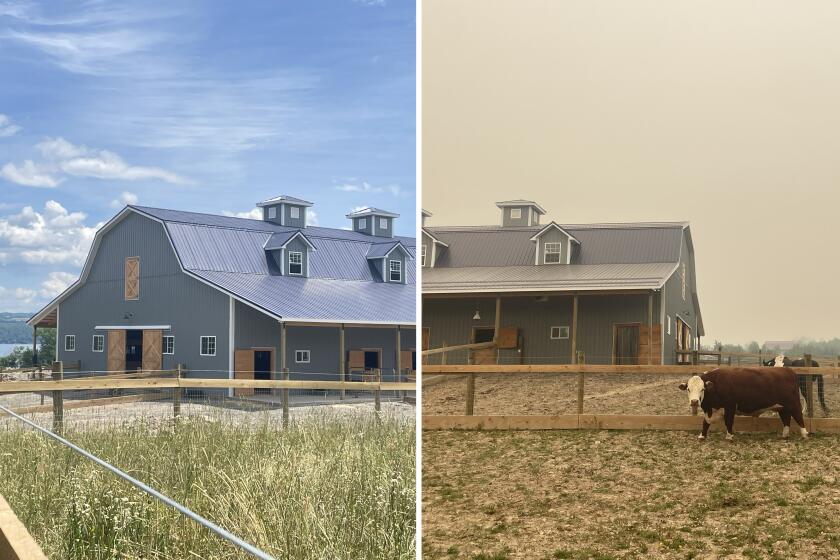More haze hangs over the Great Lakes region as Canadian wildfires burn on

- Share via
CHICAGO — The haze of unhealthful air that settled over Chicago and other Great Lakes cities Tuesday reminded Americans from the Midwest to the Northeast and as far south as Kentucky to brace for more, depending on which way the wind blows as Canadian wildfires rage.
“Until the fires are out, there’s a risk,” said Bryan Jackson, a meteorologist with the National Weather Service. “If there’s any north component to the wind, there’s a chance it’ll be smoky.”
Drifting smoke from the ongoing wildfires across Canada created curtains of haze and raised air-quality concerns throughout the Great Lakes region and in parts of the Central and Eastern United States.
The Environmental Protection Agency’s AirNow.gov site showed that parts of Illinois, lower Michigan and southern Wisconsin had the worst air quality in the U.S., and Chicago, Detroit and Milwaukee had air quality categorized as “very unhealthy.”
In Minnesota, a record 23rd air-quality alert was issued Tuesday through late Wednesday night across much of the state, as smoke obscured the skylines of Minneapolis and St. Paul. Michigan’s Department of Environment issued an air-quality alert for the entire state. Wisconsin’s Department of Natural Resources also issued an air-quality advisory for the state.
In Chicago, officials urged young people, older adults and residents with health issues to spend more time indoors.
“Just driving into the zoo ... you could just see around the buildings, kind of just haze,” said Shelly Woinowski, who was visiting the Lincoln Park Zoo in Chicago.
Smoke from Canadian wildfires poured into the U.S. East Coast, holding up flights at major airports and prompting people to fish out face masks.
Some day-care centers in the Chicago area told parents that their children would remain indoors Tuesday because of the poor air quality, while one youth sports club said it adjusted its activities to add more time indoors.
Fires in northern Quebec and low pressure over the eastern Great Lakes are responsible for the smoke, Chicago Mayor Brandon Johnson said. He added that a north wind would push the smoke farther south, moving into southern Illinois, Indiana and Kentucky overnight.
The Canadian Interagency Forest Fire Center reported Monday that nearly 30,000 square miles of land, including forests, has burned across Canada since Jan. 1. That exceeds the previous record set in 1989 of nearly 29,200 square miles, according to the National Forestry Database. Nationally, 490 fires are burning, with 255 of them considered to be out of control.
Tens of millions of Americans were under air quality alerts as smoke and pollution from wildfires in Canada settled over New York and other East Coast cities.
Even recent rainfall in Quebec likely won’t be enough to extinguish the wildfires, but the wet weather could give firefighters a chance to get ahead of the flames, officials said Tuesday.
Nearly a quarter of the fires burning in Canada are in Quebec. Environment Canada meteorologist Simon Legault said he expects rain to stop falling by Wednesday morning in the regions most affected by forest fires.
Earlier this month, massive fires burning stretches of Canadian forests blanketed the Northeastern U.S. and the Great Lakes region with smoke, turning the air yellowish gray and prompting warnings to people to stay inside and keep windows closed.
In early June, President Biden said in a statement that hundreds of American firefighters and support personnel have been in Canada since May and called attention to the fires as a reminder of the impacts of climate change.
Wildfires forced this animal sanctuary out of California. But smoke found them in their new home too
Nate Salpeter and Anna Sweet left California to escape the threat of wildfires. But no place is totally immune from the effect of climate change.
Priti Marwah, who was beginning a run along Chicago’s lakefront Tuesday, described the haze in the city as “bad.”
“Like, you can smell it bad,” she said. “I run a hundred miles a week, so this is going to be dangerous today. You can feel it ... just even parking right there and coming out, I can feel it in my lungs.”
More to Read
Sign up for Essential California
The most important California stories and recommendations in your inbox every morning.
You may occasionally receive promotional content from the Los Angeles Times.















